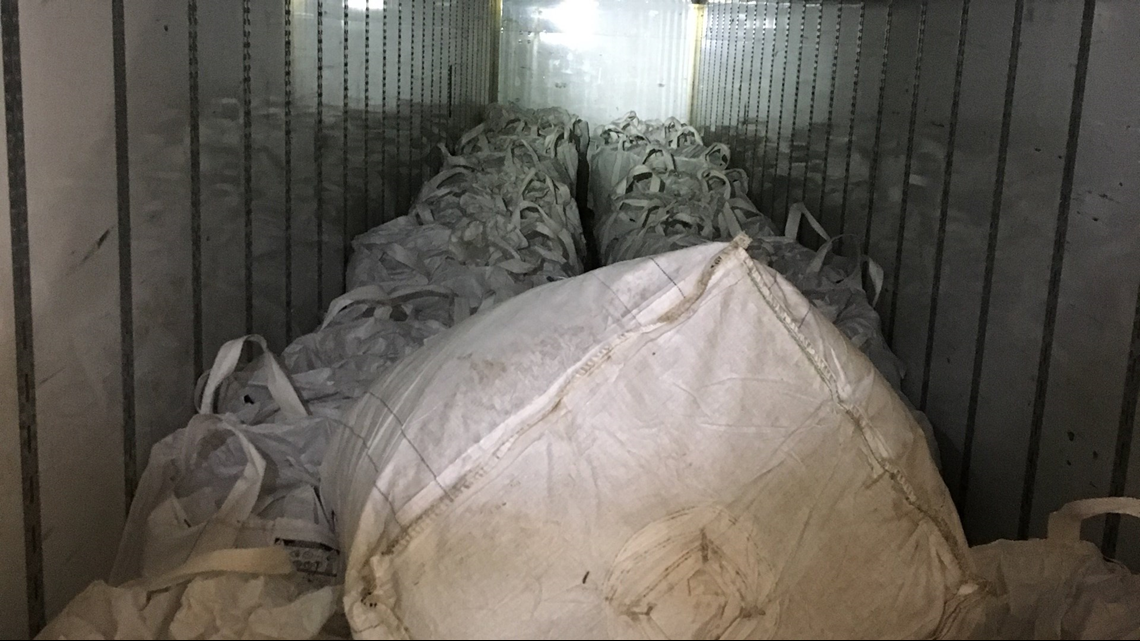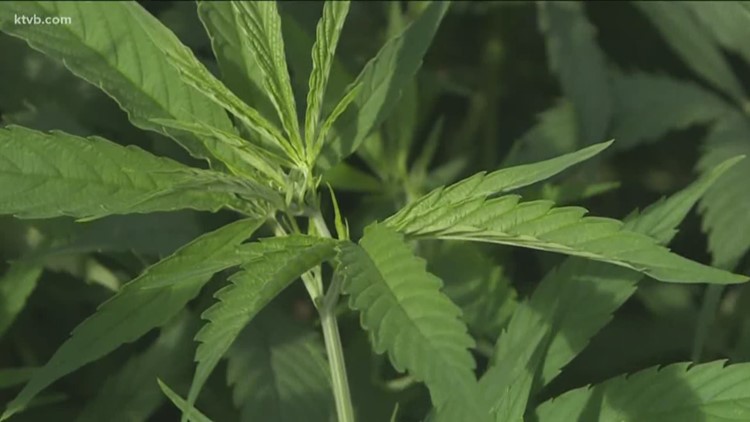BOISE, Idaho — Sometime in July, the Boise Police Department returned 69 pounds of a green leafy substance, which was hemp under federal law but technically marijuana under Idaho law, to its owner, after confiscating it weeks prior in preparation of possible criminal charges.
That transfer occurred in person, at the department’s evidence storage facility in Boise, not long after the Ada County Prosecutor’s Office declined to bring charges in the case because its prosecutors were not provided with a suspect.
The owner of the substance — Jim Hutchens, who manages an Ontario-based business called Treasure Valley Extraction — then drove it across state lines to Oregon, according to Jeremy Foresee, whose own company, Ejuice Blvd in Caldwell, partners with Hutchens.
“By releasing this property, the city of Boise is not making any representations about the legality of the product under Idaho law,” a Boise city attorney wrote in an email to Treasure Valley Extraction weeks prior to the transfer. “You may wish to consult with legal counsel prior to taking possession of the property.”
Given the way others have been treated by Idaho’s criminal justice system when in the same set of circumstances, the advice to speak with a lawyer before taking the substance back seems prudent.
Hemp’s legal status in Idaho has received a great deal of publicity and attention at the Idaho Legislature in the past year. Rep. Ilana Rubel D-Boise, told the Idaho Press she believes there will be more legislation about hemp this upcoming session. Idaho law currently draws no distinction between hemp and marijuana. It is worth noting that, even in the face of a lawsuit, the Idaho State Police has not yet returned 6,701 pounds of hemp it seized in January. The Boise Police Department’s decision to return the hemp is a markedly different approach from the Idaho State Police — and one the Ada County Prosecutor’s Office disagreed with.
“We did not endorse that release,” said Chief Criminal Deputy Prosecuting Attorney Scott Bandy. “We agree with ISP’s interpretation (of the law).”
Asked how the Ada County Sheriff’s Office would handle a situation involving a seizure of hemp, Patrick Orr, the office’s spokesman, provided the following statement:
“At the direction of the Ada County Prosecutor’s Office, our deputies are to consider hemp and marijuana the same thing – as the presence of THC in any amount means the substance is considered illegal in Idaho. So if our deputies did intercept a large amount of hemp, they would seize it, and ultimately destroy it once the case was adjudicated and it was not needed for evidence anymore.”
HEMP SHIPMENTS
Hutchens’ business, in May, was shipping the hemp to five states where hemp is legal when police took custody of it, according to police reports from the incident. The packages were not supposed to travel through Idaho. Foresee declined to provide Hutchens’ contact information to the Idaho Press, but did say he would ask if Hutchens wanted to comment.
The substance in the shipment contained tetrahydrocannabinol, the psychoactive ingredient in marijuana, and, by the generally accepted interpretation of Idaho law, that means it is legally considered marijuana and is illegal within the state. However, the amount of THC within the substance was low — less than 0.3%, according to records obtained by the Idaho Press — which means it meets the definition for industrial hemp under federal law. Hemp, though related to marijuana, does not produce a high if smoked. The plant has been praised for its myriad uses — it can be found in everything from rope to lotion to beer — and in recent years farmers and entrepreneurs across the country have cashed in on the public interest in it.
That didn’t stop the arrest and prosecution of three people in the last year-and-a-half for transporting the substance through Ada County. Two of those people — Andrew D’Addario, 28, and Erich Eisenhart, 26 — were arrested in April 2018 when police found they were driving a truck loaded with more than 900 hemp plants. D’Addario and Eisenhart were transporting the hemp on behalf of a private company, traveling from Colorado to Oregon, both states where hemp is legal.
Less than a year after that, in January, another trucker, Denis Palamarchuk, 38, was arrested for transporting hemp through Ada County, from Oregon to Colorado, on behalf of a private company. The Idaho State Police touted the 6,701-pound seizure — later confirmed as hemp — as the biggest marijuana bust in Idaho history. Given the commonly accepted reading of Idaho law, which doesn’t distinguish hemp from marijuana, it may very well have been.


All three men were initially charged with trafficking marijuana, and would have faced a mandatory five years in prison if convicted of that charge. As the cases worked their way through court, however, prosecutors agreed to a deal, in which the three pleaded guilty to misdemeanor possession of marijuana. In September, a magistrate judge sentenced each of them to unsupervised probation.
Yet their situation was identical to Hutchens’ as he drove away from the Boise Police Department’s evidence storage facility in July. The Idaho Press asked the Boise Police Department if there was any concern about creating a situation in which he was trafficking marijuana.
“Any legal interpretations are done by attorneys with either the Boise City Attorney’s Office or the Ada County Prosecutor’s Office,” BPD spokeswoman Haley Williams wrote in response to the question in an email. “You’ll have to contact them regarding your questions.”
The Boise City Attorney’s Office, through city spokesman Mike Journee, declined to comment Tuesday, citing attorney-client privilege. That’s common practice, Journee told the Idaho Press, as the office never discusses its legal advice to the city.
The Idaho Press mentioned to Foresee that it was possible Hutchens could have been pulled over by police on his way to Oregon in July.
“That actually crossed our minds,” Foresee said. “We weren’t sure how they would’ve handled that.”
CONTRASTS
The Boise Police Department did not expand on its decision to return the hemp to Hutchens, only providing the above statement.
Whatever the logic behind it, it stands in stark contrast to the Idaho State Police’s handling of 6,701 pounds of hemp it confiscated from Palamarchuk in January. That shipment of hemp, which belongs to Colorado-based Big Sky Scientific and is worth an estimated $1.3 million, remains in the agency’s evidence storage area. More than once, the Idaho State Police has declined to let the company inspect the hemp to see if it is still in good condition, said Elijah Watkins, the company’s lawyer, in a interview with the Idaho Press in recent months.
The company has sued the Idaho State Police to get the product back, and even though the criminal case against the trucker is closed, the state has not yet returned the substance.
The Idaho Press received emails from the Boise City Attorney’s Office to the owner of the hemp in the most recent case. The name or names of the people the city was corresponding with have been redacted.
One email sent to the city attorney’s office in June mentions the return of the product had been pushed back due to a “judicial review.”
“After a decade of working with law enforcement and speaking with my associates in law enforcement, this seems unusual,” the message reads. “I was always under the presumption that once the prosecutor dropped something it was done.”
The sender also wrote that if the hemp went bad while in police custody, they would “be forced to seek reimbursement.”
The Boise Police Department agreed to return the hemp about a month after that.
UNCERTAINTY
Foresee’s statement about the lack of certainty on how authorities would have handled a case of hemp possession sums up how Rubel feels about the enforcement of Idaho’s marijuana laws when it comes to hemp.
“Nobody has any idea what the prosecutors will do when they’re faced with these gray areas,” Rubel said.
She called the disparity between hemp-related cases a “very unequal and unfair application of whatever the law is.”
She voted to change “whatever the law is” during this past legislative session, in addition to asking Ada County Prosecutor Jan Bennetts to drop charges against the three truck drivers charged for moving hemp through the county.
Earlier this year, Rep. Caroline Nilsson Troy, R-Genesee and Rep. Dorothy Moon, R-Stanley, introduced a bill to legalize the sale and transportation of hemp in Idaho, as well as remove it from the state’s list of controlled substances. That law would have brought Idaho law into conformity with federal statutes.
The effort was unsuccessful. The Idaho Senate made changes to the bill the Idaho House deemed unacceptable, and in April the bill died.
Foresee, who works with Hutchens, said he empathizes with police and believes they are in an impossible position, because hemp and marijuana look and smell very similar.
“What are they supposed to do with that?” he said. “You can’t blame them.”
Rubel said lawmakers in this upcoming legislative session are planning to introduce another bill clarifying Idaho’s laws on hemp and marijuana. She noted Idaho is one of the only states in the country in which hemp is not legal.
The state’s laws have created uncertainty for business owners. Rubel cited the case of a friend of hers who owns a lotion business in Idaho, and has, in the past, sent his product out of state. Lotion infused with CBD oil — derived from hemp — has become popular in recent years, but he isn’t comfortable making it or providing it through his business.
Advocates for legalizing hemp also point to Idaho farmers’ loss of business. Ryan Shore, CEO of Big Sky Scientific, one of the companies whose truckers was charged for shipping hemp through Idaho, previously told the Idaho Press the crop is worth between a few dollars and $10 per pound in 2019. Strawberries, by comparison, might be worth a dollar a pound, he said.
“It’s kind of a shame when it comes to Idaho right now, because we’re denying our farmers a good cash crop,” Foresee said.
Compounding the problem is the fact that Oregon, on Idaho’s western border, is something of a mecca for hemp farmers. Foresee said the atmosphere and the soil in Oregon are ideal for growing the crop, and said customers will look specifically for Oregon hemp. Idaho is effectively an 83,000-square-mile barrier in the transport of the product.
But that might change, at least for those transporting hemp through the state. Rubel said clearer federal guidelines governing the interstate transport of hemp are due to go into effect soon, and that would mean the interstate transport of hemp across Idaho would be legal.
It would still be illegal for Idaho farmers to grow or sell hemp, though. That’s what she wants to change.
Bandy, the prosecutor, said the Ada County Prosecutor’s Office was never opposed to hemp as an agricultural product, and said prosecutors were never opposed to talking about legislation. Prosecutors were concerned, however, about how any proposed legislation would affect police officers’ ability to enforce the state’s marijuana laws.
In a March statement, the Idaho Prosecuting Attorney’s Association said there was no roadside tests available for police to use to determine if a substance is hemp or marijuana, although Moon told the legislature in February she had found a company selling such devices.
Foresee was amazed at lawmakers’ reluctance to embrace the crop, calling its many uses “remarkable.”
“It’s a little bit mind-boggling, because hemp won’t hurt anybody,” he said.
More from our partner Idaho Press: Caldwell resident wins public records lawsuit against Middleton School District
Watch more Crime:
See them all in our YouTube Playlist:



